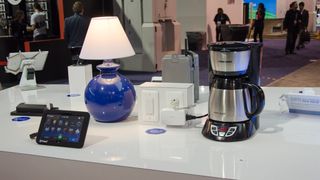Chatting with your fridge: do you need to be an IT Pro?
Network management at home

The emergence of the so-called 'internet of things' has featured heavily in tech discourse for some time now, but is rarely discussed in the context of the present. Inter-connectivity between all our personal devices and home appliances still feels like a far-off, largely futuristic concept.
But LG and its industry peers now look set to change all that. Earlier this year the Korean manufacturer announced a communication feature enabling users to chat to their domestic machines, and similar services are expected to proliferate throughout the industry in the coming months and years.
But what does this mean for you and your home? Do you need to be an IT expert to effectively manage your home network? Stephen Demianyk, Channel Manager at software firm Ipswitch, gives us the low down.
TechRadar Pro: LG announced that it is to launch a service allowing you to send texts to your LG kitchen appliances with instructions. How significant is this news?
Stephen Demianyk: This news indicates that the futuristic vision of the "Smart Home" is on the verge of becoming a reality for consumers. It shows that technology giants that manufacture our consumer goods are viewing the idea of the connected home as a serious commercial opportunity. What's significant is that these mainstream products are launching now, rather than simply a concept being discussed.
TRP: How will this technology improve our everyday lives?
SD: The new text service will allow you to check food levels in your fridge and even check for expired food. You can also set your washing machine to start its cycle and the oven to start heating – and alert them if you are running late and they need to delay.
Are you a pro? Subscribe to our newsletter
Sign up to the TechRadar Pro newsletter to get all the top news, opinion, features and guidance your business needs to succeed!
It's all about making our lives easier and increasing the capabilities of the household appliances that we often take for granted. We're all busy people these days, so if technology can lighten the load that can only be a good thing.
TRP: What will the impact be on our home networks?
SD: Currently, most people wouldn't even think they had a network in their home. Usually, a home network would just support a few laptops, smartphones and tablets. As homes become "smarter" appliances will rely on the network to communicate with each other.
As a result, networks will become more and more complex and will start to resemble the networks we see in businesses. Complex networks are harder to manage, and if they are not managed correctly, things can go wrong.
TRP: Who will manage these home networks?
SD: There is no getting away from the fact that these big, complex networks will need to be managed. The most obvious solution is that one person in each household takes on responsibility for the network and becomes almost an amateur network manager.
Perhaps, in the future we will see a new kind of managed service provider to take on the managing of home networks.
TRP: How does this compare to the role of a network manager in the workplace?
SD: The home network manager will need to have an understanding of the same basic principles as an enterprise network manager. They will need to know how they are configured, how many devices are connected to the internet/network and their status; what's up, what's down, and performance issues like when something is online but not performing. They'll want to know who is using the devices and where they are located.
They will also need to know how to find the source of a problem that is somehow hard to identify through basic means ("the little green light is on but it's not working").
TRP: What challenges will the home network manager face?
SD: The main issue is that the average person is not an IT expert, and managing a network is a big task. The network monitoring tools designed for enterprise networks are likely to be too complex for an untrained person, and only a few tools designed for home networks currently exist.
Taking care of a network also takes time, which most people have precious little of, and checking the status of the network will probably not be a high priority for most.
TRP: How should network vendors respond?
SD: The technology that goes into creating smartphones is developing rapidly. Therefore, the technology to manage it needs to keep up at the same pace. In order for the average person to successfully manage their own network, there must be affordable and easy to use products and solutions available.
TRP: What support needs to be available?
SD: This is where service providers come in. There will need to be support available to help with network set-up and to provide assistance if something does go wrong and there is a connection issue. An opportunity to be recognised by the IT reselling and service provider industry.

Désiré has been musing and writing about technology during a career spanning four decades. He dabbled in website builders and web hosting when DHTML and frames were in vogue and started narrating about the impact of technology on society just before the start of the Y2K hysteria at the turn of the last millennium.
